Daily Vocabulary Words: List of Daily Used Words
Hi there. Welcome to this special section @ Wordpandit.
Our endeavour here is straightforward: highlighting important daily vocabulary words, you would encounter in The Hindu. This is your repository of commonly used words; essentially, we are posting a list of daily used words. Hence, this has significant practical application as it teaches you words that are commonly used in a leading publication such as The Hindu.
Visit the website daily to learn words from The Hindu.
WORD-1: Putative
CONTEXT: the BJP is courting allies with alacrity, the putative alliance of Opposition parties that appeared on the horizon in mid-2023 is unravelling, if at all it ever took any concrete form.
SOURCE: The Hindu
EXPLANATORY PARAGRAPH: Imagine you have a toy that you think is hidden under the bed because you remember putting it there. Even if you haven’t seen it yet, you believe it’s there. “Putative” is a word we use when we think something is true or supposed to be true, even if we’re not completely sure.
MEANING: Generally considered or reputed to be (adjective).
PRONUNCIATION: PYOO-tuh-tiv
SYNONYMS: assumed, supposed, presumed, believed, alleged
USAGE EXAMPLES:
1. The putative author of the book has not been confirmed.
2. They inherited a fortune from their putative father.
3. The putative benefits of the new policy were widely discussed.
4. She was the putative leader of the group, recognized by most.
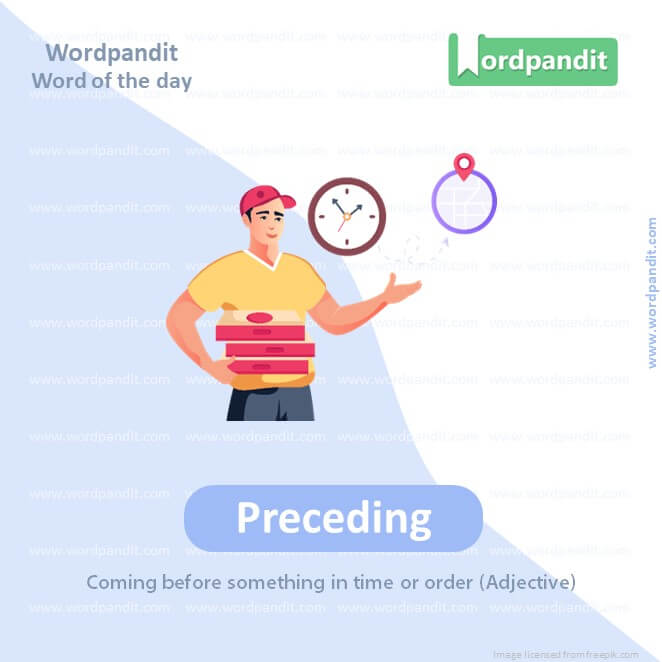
WORD-2: Preceding
CONTEXT: who is now championing a third consecutive term for the BJP at the Centre, after calling for its defeat in the preceding months.
SOURCE: The Hindu
EXPLANATORY PARAGRAPH: Imagine you are standing in a line for ice cream. The person who is in line before you, the one you’re standing behind, was there before you. We say that person is “preceding” you in line. It means coming before or earlier than something or someone else.
MEANING: Coming before something in time or order (Adjective)
PRONUNCIATION: prih-SEED-ing
SYNONYMS: previous, prior, foregoing, antecedent, former
USAGE EXAMPLES:
1. In the preceding year, the company had made a significant profit.
2. The preceding chapter explains the theory in detail.
3. The events preceding the ceremony were filled with anticipation.
4. She mentioned the facts stated in the preceding paragraphs.
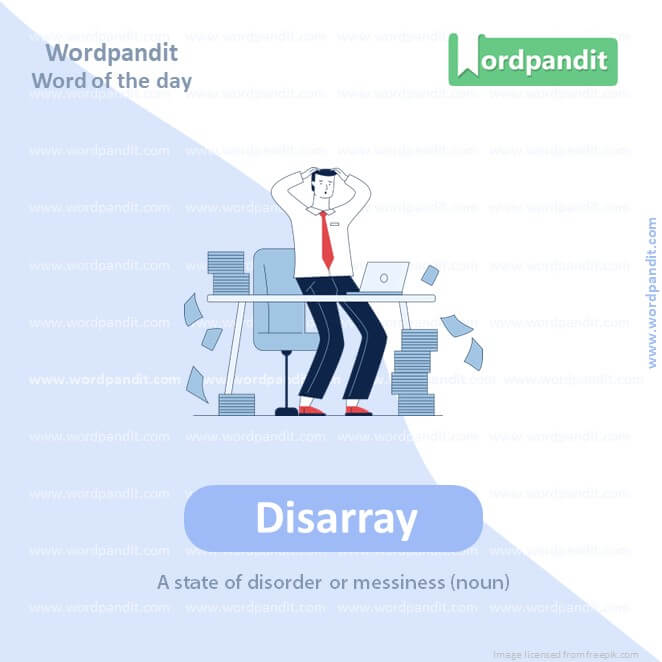
WORD-3: Disarray
CONTEXT: A corresponding disarray is evident in the Opposition camp, as parties and individual leaders are jumping on the BJP bandwagon.
SOURCE: The Hindu
EXPLANATORY PARAGRAPH: Imagine your room is very messy; toys are everywhere, clothes are on the floor, and nothing is where it’s supposed to be. That messiness and confusion is what “disarray” means. It’s when things are not organized or in order.
MEANING: A state of disorder or messiness (noun)
PRONUNCIATION: dis-uh-RAY
SYNONYMS: disorder, confusion, chaos, mess, clutter
USAGE EXAMPLES:
1. The room was in complete disarray after the party.
2. The team was in disarray after their coach left.
3. Her plans were thrown into disarray by the unexpected news.
4. The documents were in disarray, making it hard to find anything.
WORD-4: Incoherence
CONTEXT: The emaciated INDIA bloc also suffers from incoherence with allies such as the Trinamool Congress.
SOURCE: The Hindu
EXPLANATORY PARAGRAPH: Imagine trying to tell a story about your day, but instead of telling it in order, you mix up when things happened, skip parts, and change topics quickly. It makes it hard for others to understand. “Incoherence” is when things don’t connect or make sense together.
MEANING: The quality of being unclear or difficult to understand because of not being logically connected (noun).
PRONUNCIATION: in-koh-HEER-uhns
SYNONYMS: confusion, disjointedness, illogicality, unintelligibility, rambling
USAGE EXAMPLES:
1. His speech was marked by incoherence, jumping from one subject to another.
2. The narrative suffers from incoherence, making it difficult to follow.
3. After the accident, she spoke with incoherence due to her injuries.
4. The essay was hard to grade due to its incoherence.
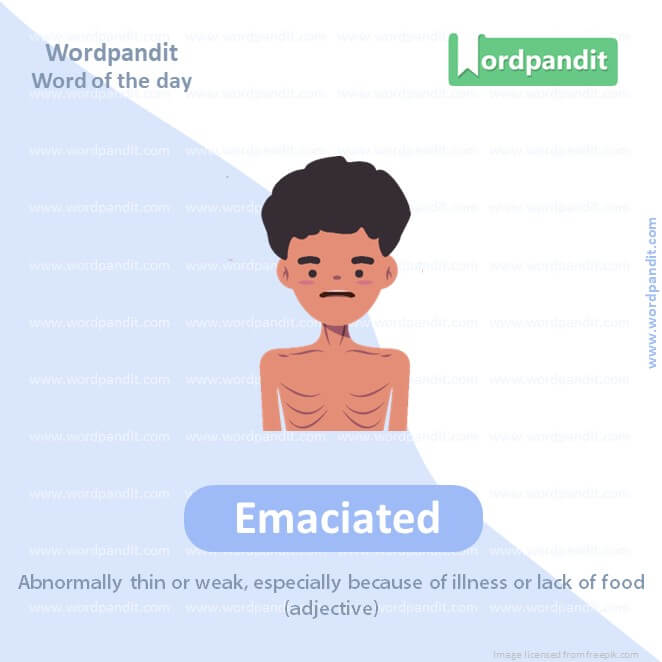
WORD-5: Emaciated
CONTEXT: The emaciated INDIA bloc also suffers from incoherence with allies such as the Trinamool Congress .
SOURCE: The Hindu
EXPLANATORY PARAGRAPH: Imagine a stray dog that hasn’t had enough to eat for a long time, and now you can see its bones under its skin because it’s so thin. That’s what “emaciated” means. It’s when someone or something becomes very, very thin because they haven’t been getting enough food.
MEANING: Abnormally thin or weak, especially because of illness or lack of food (adjective).
PRONUNCIATION: ih-MAY-shee-ay-tid
SYNONYMS: gaunt, skeletal, starved, wasted, scrawny
USAGE EXAMPLES:
1. The rescue team found an emaciated animal in the abandoned house.
2. He looked emaciated after months of being lost in the wilderness.
3. The emaciated figure of the prisoner spoke volumes of his ordeal.
4. The photograph showed emaciated children in need of aid.
WORD-6: Inglorious
CONTEXT: This role of the state in influencing party politics in India is a disturbing sign for the health of Indian democracy, and also of the inglorious records of the many Opposition leaders.
SOURCE: The Hindu
EXPLANATORY PARAGRAPH: Imagine you built a tower of blocks, but instead of standing tall, it falls over because the base wasn’t strong. If someone called it an”inglorious” tower, they mean it’s not something to be proud of because it didn’t turn out well. “Inglorious” is used for things that don’t bring honor or pride.
MEANING: Not bringing honor or praise; shameful or disgraceful (adjective).
PRONUNCIATION: in-GLOR-ee-us
SYNONYMS: disgraceful, shameful, dishonorable, ignominious, infamous
USAGE EXAMPLES:
1. The team’s inglorious defeat was hard for the fans to accept.
2. He led an inglorious life, full of mistakes and missed opportunities.
3. The inglorious end of the empire was remembered by historians.
4. Their inglorious actions tarnished the organization’s reputation.
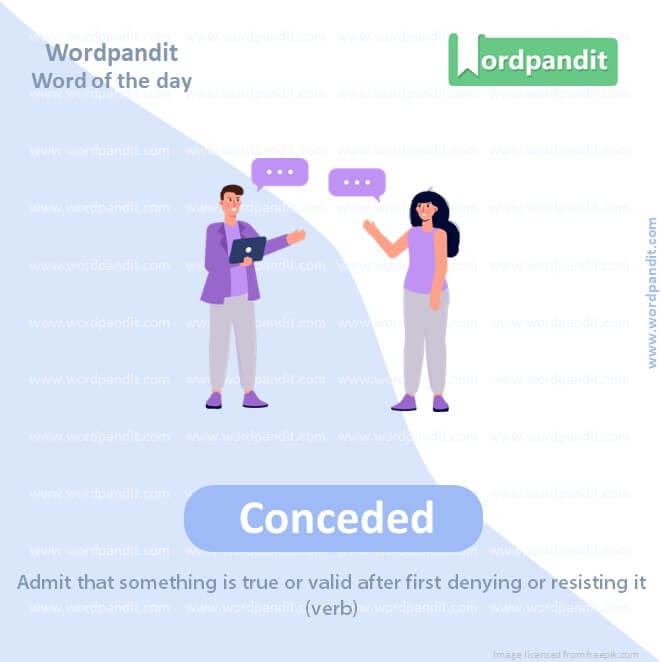
WORD-7: Conceded
CONTEXT: As the Socialists have already conceded the election, he is likely to form a minority government.
SOURCE: The Hindu
EXPLANATORY PARAGRAPH: Imagine you and your friend are arguing about the color of the sky. You say it’s blue, but your friend says it’s green. After looking up at the sky, your friend realizes you’re right and says, “Okay, the sky is blue.” That’s called “conceding.” It means admitting that something is true after first not agreeing with it.
MEANING: Admit that something is true or valid after first denying or resisting it (verb).
PRONUNCIATION: kuhn-SEED-ed
SYNONYMS: admit, acknowledge, allow, grant, accept
USAGE EXAMPLES:
1. After a long debate, he finally conceded that I was right.
2. The losing candidate conceded the election late at night.
3. She conceded the point with reluctance, still not fully convinced.
4. The company conceded to the demands of the workers after the strike.
WORD-8: Blunted
CONTEXT: The scandal had tarnished the Socialists, but the party that made gains out of it was the anti-establishment Chega whose rise blunted the edge the Social Democrats had had in the early stage of the campaign.
SOURCE: The Hindu
EXPLANATORY PARAGRAPH: Imagine using a pencil to draw, and after a while, the sharp point becomes dull, so it doesn’t draw as well. That’s what “blunted” means. It’s when something that was sharp or clear becomes dull or not as effective.
MEANING: Having a worn edge or point; not sharp (adjective).
PRONUNCIATION: BLUHN-ted
SYNONYMS: dulled, numbed, weakened, deadened, dimmed
USAGE EXAMPLES:
1. The blunted knife could barely cut through the bread.
2. His senses were blunted by tiredness.
3. The criticism blunted his enthusiasm for the project.
4. The impact of the blow was blunted by the helmet.
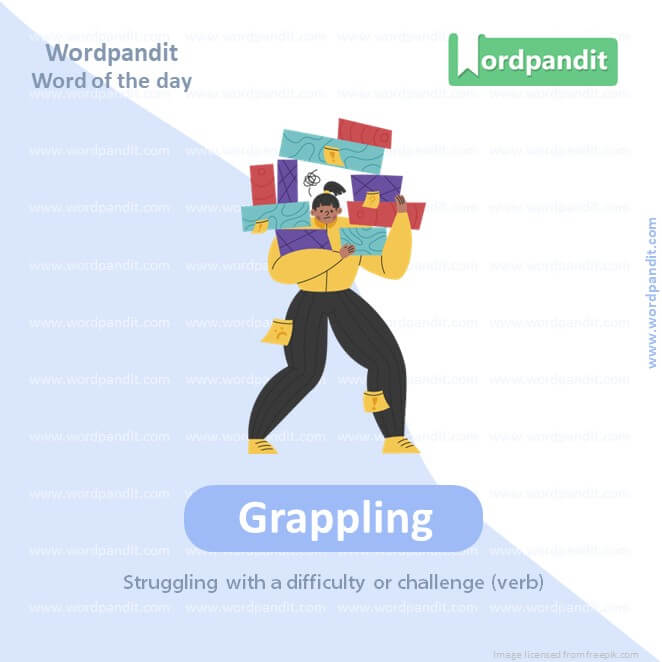
WORD-9: Grappling
CONTEXT: The country is grappling with persistent low wages and higher inflation, and housing prices have doubled in less than a decade.
SOURCE: The Hindu
EXPLANATORY PARAGRAPH: Imagine trying to hold onto a wiggly puppy that doesn’t want to take a bath. You have to catch it, hold it tight, and maybe it tries to get away, but you keep trying to keep a good grip. That’s “grappling.” It means struggling to deal with something difficult or to hold onto something tightly.
MEANING: Struggling with a difficulty or challenge (verb)
PRONUNCIATION: GRAP-ling
SYNONYMS: wrestling, struggling, contending, combatting, tackling
USAGE EXAMPLES:
1. The wrestlers were grappling with each other on the mat.
2. She spent years grappling with the decision to move abroad.
3. The community is grappling with the issue of homelessness.
4. Policymakers are grappling with how to address climate change.
WORD-10: Cornerstone
CONTEXT: The Khelo India mission has been the cornerstone of Prime Minister Narendra Modi’s vision of a nation oozing with energy.
SOURCE: The Hindu
EXPLANATORY PARAGRAPH: Imagine building a big Lego castle, and the very first block you put down is the most important because it helps you know where to build everything else. That first block is like a “cornerstone.” It’s something very important that everything else depends on or is built around.
MEANING: The basic, essential, or most important part of something upon which everything else depends (noun).
PRONUNCIATION: KOR-ner-stohn
SYNONYMS: foundation, keystone, bedrock, base, mainstay
USAGE EXAMPLES:
1. Trust is the cornerstone of any healthy relationship.
2. The cornerstone of the new library will be laid down in a ceremony.
3. Education is often considered the cornerstone of a successful society.
4. The treaty was a cornerstone in the peace process between the countries.
Vocabulary Words with Meaning, Synonyms and Antonyms PDF
The voyage to language mastery often involves decoding the ‘vocabulary words with meaning, synonyms and antonyms PDF’. This valuable resource is a treasure chest of words, offering definitions, similar phrases, and contrasting expressions all in one place. Yet, recognizing the full potential of ‘vocabulary words with meaning, synonyms, and antonyms PDF’ entails more than just glossing over the words, it demands active and strategic engagement.
To uncover the richness of ‘vocabulary words with meaning, synonyms and antonyms PDF’, focus on understanding the context of each word, along with its synonyms and antonyms. Group words under themes to create word maps, linking synonyms and contrasting antonyms, for a better grasp of the material.
When delving into a ‘vocabulary words with meaning, synonyms and antonyms PDF’, use annotation tools for an interactive study experience. Make personal notes about each word and how you connect with it. This personalized touch aids in memorization and enhances recall.
To cement the learning from ‘vocabulary words with meaning, synonyms and antonyms PDF’, regular revision is pivotal. Spaced repetition, a learning technique where intervals between each review are gradually increased, can significantly enhance long-term memory retention.
The most crucial aspect, however, is practical application. The ‘vocabulary words with meaning, synonyms and antonyms PDF’ should act as a springboard for real-world application. Incorporating learnt words, along with their synonyms and antonyms, in conversations or digital interactions, reinforces understanding and boosts fluency.
In conclusion, navigating the ‘vocabulary words with meaning, synonyms and antonyms PDF’ is a cerebral adventure. A blend of contextual learning, annotation, regular revision, and practical application makes the journey a rewarding one. Grasping ‘vocabulary words with meaning, synonyms and antonyms PDF’ not only enriches your language skills but also adds vibrancy to your linguistic expressions.











